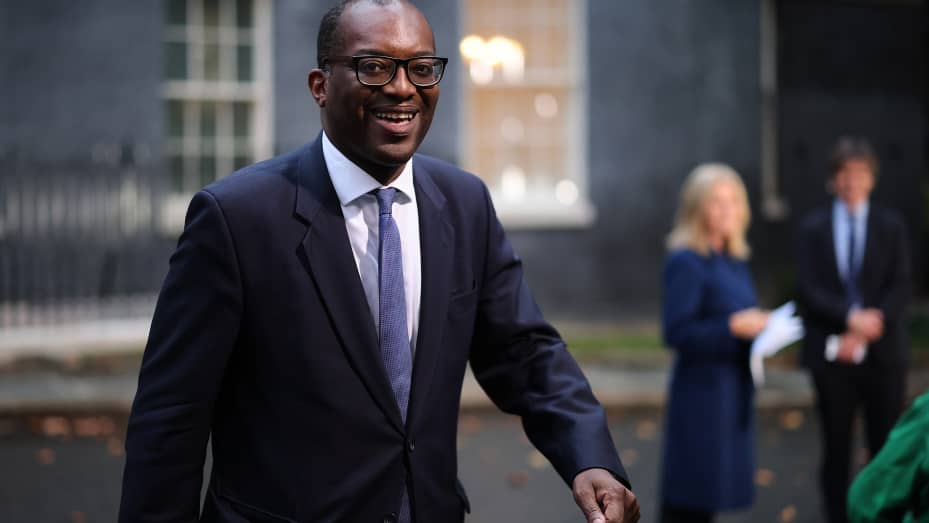
BIRMINGHAM, United Kingdom, Oct 3, 2022 (BSS/AFP) - Britain's under-fire finance minister Kwasi Kwarteng on Monday vowed to press on with his controversial economic reform plans, despite announcing a dramatic U-turn on a controversial tax cut for high earners.
The proposed cut was part of a debt-driven economic package that has bombed with the markets, the electorate and much of the ruling Conservative party.
The abrupt reversal raised questions about his and Prime Minister Liz Truss's right-wing policy agenda, less than a month after taking power and a day after both vowed to stay the course.
"What a day. It has been tough," Kwarteng said in a speech to the Tories' annual conference in Birmingham, central England.
But he told delegates that "we need to focus on the task in hand", implicitly criticising his Tory predecessors by saying there was a need to boost the economy out of its "slow, managed decline".
"To grow the economy we really do need to do things differently," he said.
Kwarteng pointedly avoided any specific mention of his about-face on the proposed scrapping of the 45 percent top rate of income tax.
But he insisted his and Truss's contentious plans, which include axing a cap on bankers' bonuses and reversing a planned rise in corporation tax, as well as a recent hike in national insurance contributions, were "sound" and "credible".
"It will increase growth," he added in the speech, which was delayed by an unspecified security alert at the venue. Police lifted the alert about an hour later.
- Political storm -
Earlier, Kwarteng said he had never considered resigning over the furore caused by the proposals, saying only that the decision to drop the tax cut was because it had become a "distraction".
On the markets, the intention to pay for the cuts with billions more in extra borrowing had sent the pound tumbling to a record low against the dollar and UK government bond yields soaring.
The pound rebounded Monday as the government partially reversed course.
Nevertheless, Kwarteng and Truss remain in the eye of a political storm, given the perceived unfairness of the package, which could yet see cuts to spending and benefits amid Britain's worst cost-of-living crisis in generations.
As late as Sunday, the finance chief had been due to tell the conference that "we must stay the course", according to a preview of his speech released by the Conservatives.
Truss on Sunday admitted communication errors in how the September 23 economic package had been presented, but agreed she was "absolutely committed" to abolishing the top tax rate.
Within 24 hours, though, the 47-year-old prime minister -- only in the role since September 6 -- had performed one of most striking government U-turns in recent memory.
Truss told the BBC she had not discussed axing the high-earners' tax band with her cabinet, who only seemed to learn of the reversal along with the public on Monday.
She also appeared to distance herself from the move by claiming "it was a decision that the chancellor made", but her spokesman downplayed the comments.
"The prime minister was clear that... fiscal events are the responsibility of the chancellor -- that's all she was setting clear," he told reporters Monday.
Out of a total tax package worth o45 billion ($50 billion), the top rate cut would have cost some o2 billion -- relatively small, but outsized for its political impact.
Tory MPs who backed former finance minister Rishi Sunak -- Truss's rival in the recent Tory leadership race -- had threatened to vote it down, raising the prospect of a major battle in the House of Commons.
Grant Shapps, who was refused a cabinet job by Truss, welcomed her scrapping the tax cut, which he told BBC radio had been planned with "grossly insensitive timing".
- Credibility 'destroyed' -
With the U-turn, the stakes have soared for Truss as she prepares to close the party conference with a speech Wednesday.
A raft of polls have found Truss and her economic package deeply unpopular, alongside plummeting ratings for the Tories.
Some surveys showed Labour with mammoth leads of up to 33 points -- its biggest since the heyday of its former prime minister Tony Blair in the late 1990s.
Labour's finance spokeswoman Rachel Reeves said the climbdown "comes too late for the families who will pay higher mortgages and higher prices for years to come" following the recent market turmoil.
"The Tories have destroyed their economic credibility and damaged trust in the British economy," she said.